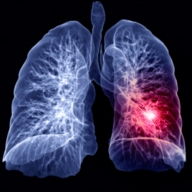A CT Scan Can Save Your Lungs and Your Life from Cancer
From an article by
Amy Perugini, RN
McLeod Lung Cancer Screening Nurse Navigator
Low-dose CT scans can now detect small, early-stage, potentially curable lung tumors. Results of a trial with more than 53,000 former or active smokers showed a low-dose CT scan of the chest was better than a chest X-ray for detecting early lung cancer.
Early-stage cancer can often be treated with minimally invasive surgery or a few radiation treatments. When lung cancer is detected at an early stage, patients have a five-year survival rate of 56% after treatment. If the cancer has spread to nearby organs, the five-year survival rate sinks to 5%.
This is the biggest advancement in lung cancer detection for more than 25 years. Some 90% or more of all lung cancers are caused by cigarette smoking, according to the Centers for Disease Control and Prevention (CDC). The risk of developing lung cancer for a current smoker with a history of smoking a pack a day for 40 years is about 20 times higher than that of the non-smoker.
As with most cancers, early detection remains the key to survival. Early-stage lung cancer patients often do not have symptoms and can go for months and potentially years without detection.
Until recently, there were not reasonable tests for early detection because the tumors are not always visible on a chest X-ray. Historically, a patient would not be diagnosed with lung cancer until they developed symptoms, such as coughing up blood, unintentional weight loss, or shortness of breath.
The Screening Guidelines followed by McLeod Health include:
- Ages 50 to 80 years, who have had a 20 or more pack-year history of cigarette smoking (20 pack-year is equivalent to one pack per day for 20 years or two packs per day for 10 years)
- Currently, exhibiting no symptoms of lung cancer
- Currently smoking or have quit smoking within the last 15 years
ACTION YOU CAN TAKE
You can have a CT Lung screening at McLeod Regional Medical Center (Florence), McLeod Health Dillon, McLeod Health Cheraw, McLeod Health Seacoast (Little River) and McLeod Health Clarendon.
Learn more about the Lung Cancer Screening Program or call the McLeod Healthy Lung Initiative at 843-777-5953.
-
McLEOD REGIONAL MEDICAL CENTER FLORENCE
843-777-2000 -
McLEOD DARLINGTON
843-777-1100 -
McLEOD DILLON
843-774-4111 -
McLEOD LORIS
843-716-7000 -
McLEOD SEACOAST
843-390-8100 -
McLEOD CHERAW
843-537-7881 -
McLEOD CLARENDON
803-433-3000



-
McLEOD REGIONAL MEDICAL CENTER FLORENCE
843-777-2000 -
McLEOD DARLINGTON
843-777-1100 -
McLEOD DILLON
843-774-4111 -
McLEOD LORIS
843-716-7000 -
McLEOD SEACOAST
843-390-8100 -
McLEOD CHERAW
843-537-7881 -
McLEOD CLARENDON
803-433-3000
 Find a Doctor
Find a Doctor  Locations
Locations  Services
Services 